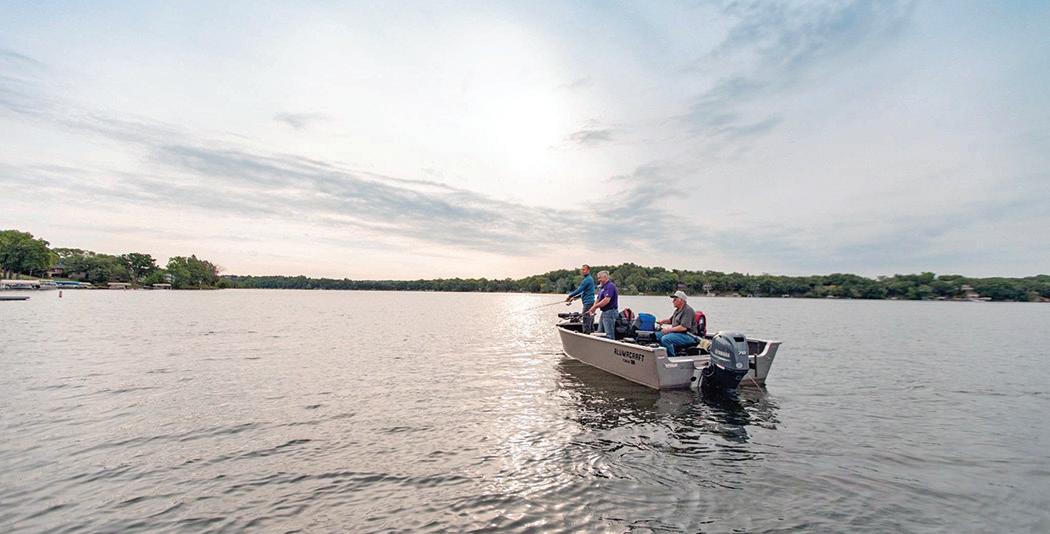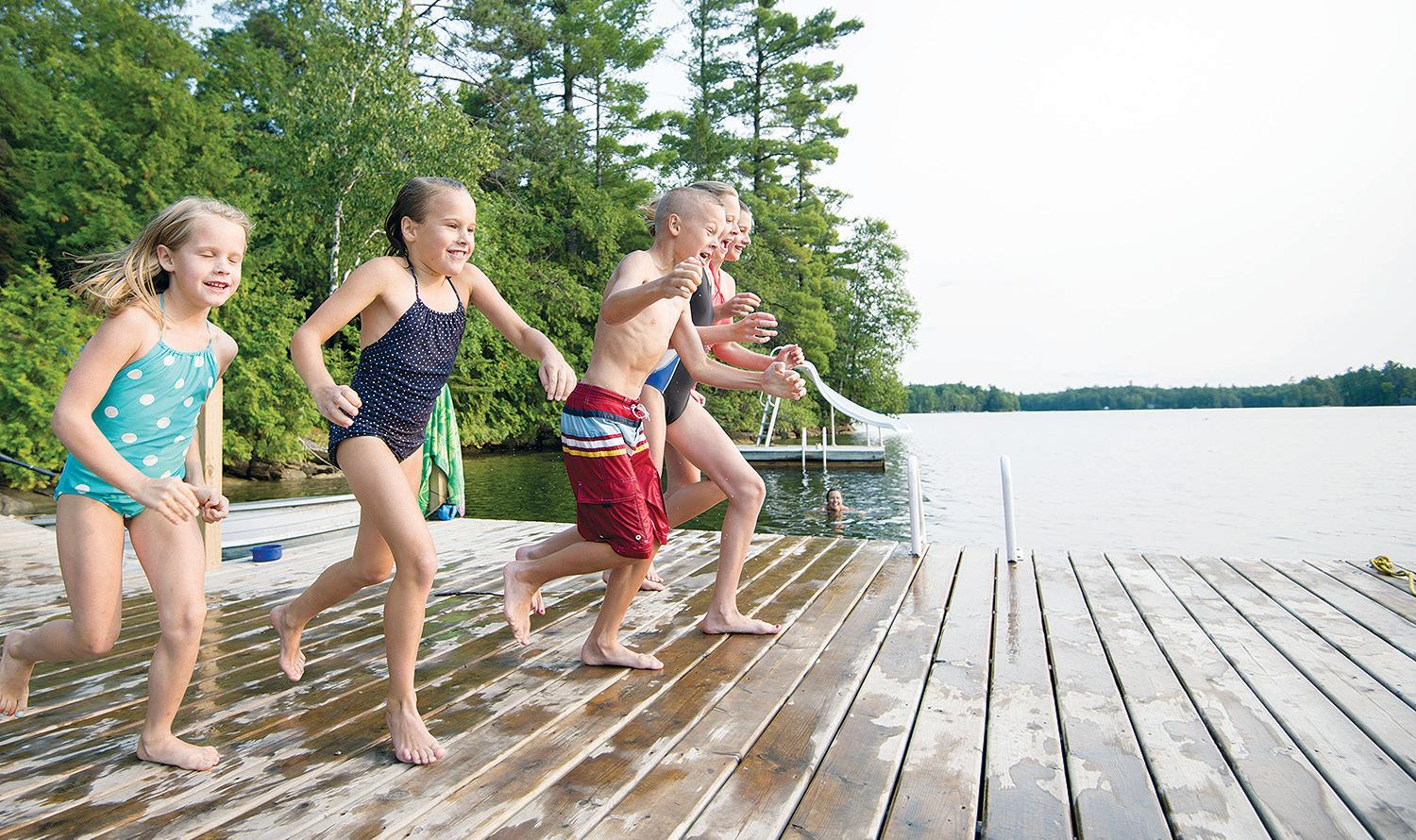
4 minute read
How to celebrate safely while boating this season
Boating season is here, and we couldn’t be more excited. In our opinion, having a good time on the water is what summer is all about. However, behaving irresponsibly leads to accidents that could put your life and others’ lives at risk.
Boating under the influence is a federal offense subject to a $1,000 fine. In addition, criminal penalties (as well as possible jail time) are subject to fines as high as $5,000. Therefore, it’s crucial that you refrain from drinking and boating.
Keep reading for some boating best practices and the answers to the most frequently asked questions.

Ready to take your celebration to the water? Make sure to follow these rules when you do:
Have a sober captain. It doesn’t matter whether you’re in a car or a boat –drinking and driving is always a bad idea. A sober captain guarantees that everyone has fun and stays safe. And as we mentioned, a drunk (or drinking) captain faces large fines and potential jail time.
Remember, the decision to designate a sober captain is not just about adhering to the law but also about prioritizing the well-being and safety of everyone involved. By staying alcohol-free, the captain can focus entirely on their duties and navigate the waters carefully.
Boat days are all about having fun – but it’s important that you don’t go overboard (pun intended). Therefore, the captain should designate a sober first mate to help keep the crew in check, which minimizes distractions and potential dangers.
The first mate plays a vital role in promoting a safe boating experience. They can assist the captain in monitoring the weather conditions, keeping an eye out for other vessels, and ensuring that all safety protocols are followed. With their sober presence, they can react swiftly and effectively in case of emergencies, keeping everyone on board secure. Before the party starts, ensure everyone on board has a properly fitting life jacket (including kids and pets). A life jacket that is too large will slip off the wearer, and one that’s too small might not offer sufficient buoyancy. Wearing a life jacket ensures everyone on board stays safe, which is always in style.
When it comes to enjoying a day out on the water, the last thing you want is a mishap that puts a damper on the fun. Bringing glassware on board may seem convenient, but the risks outweigh the benefits. If glass shatters while onboard, you risk damaging the boat’s upholstery or, worse, causing harm to someone’s skin.
Instead, pack cooler cups for your next boating adventure. Not only will these cups keep your drinks cool, but they’re also specifically built to withstand the rigors of outdoor adventures.
Whether you’re on the water for a weekend or an hour, basking in the sun’s rays can become draining. Not to mention, they significantly amplify the effects of alcohol. Ensure everyone on board stays hydrated and eating plenty of snacks. Additionally, throwing some electrolytes – like coconut water or Liquid IV – into your cooler is not a bad idea.

Typically, the crew outnumbers the captain on any boating adventure. Therefore, listening to their directions will make their job at the helm much easier.
Don’t pressure them to drink or roughhouse while on board. Instead, follow their rules, and behave responsibly and respectfully.
• CONTINUED ON PAGE 4 above: The boating season is the perfect time to make lasting memories with friends and family on the water. And if you keep a few safety rules in mind, there will be many funfilled days in the future. and blue boat trailer sticker with a graphic showing all of the places where plants, tiny animals and potentially contaminated water can hide on a boat and trailer.
“It only takes a minute to remove plants, animals, mud or debris from boats, trailers and equipment and to drain all water from bilges, livewells and bait buckets,” said Erin McFarlane, the Statewide Clean Boats Clean Waters Educator with Extension Lakes. “These simple steps help keep invasive species from hitching a ride from one lake or river to another.”
Every boater and angler has a role to play in protecting Wisconsin’s lakes and rivers. Everyone should follow these prevention steps, required by Wisconsin state law, to help prevent the spread of aquatic invasive species in our waters:
• Inspect boats, trailers and equipment;
• Remove all attached aquatic plants and animals;
• Drain all water from boats, vehicles and equipment, including livewells and buckets containing fish;
• Never move plants or live fish away from a waterbody;
• Dispose of unwanted bait in the trash; and
• Buy minnows from a Wisconsin bait dealer.
Additionally, only use leftover minnows when fishing with them on the same body of water. They can be used on other waters only if no lake or river water or other fish have been added to their container.
To learn more about invasive species and their impacts on Wisconsin’s waters and economy, visit the DNR’s invasive species webpage at dnr.wi.gov.
Boating Safety
Below are the answers to some of the most frequently asked questions about alcohol and boating:
Can you drink and drive a boat?
Boating under the influence of alcohol or drugs is illegal and can result in severe fines or jail time. In addition, it can put your life and others’ lives at risk.
Can you drink alcohol while on a boat?
As long as you’re not the one operating the boat (aka the captain) and are over the age of 21, it’s okay to responsibly drink alcohol aboard. Again, boat captains should never drink and drive a boat under any circumstances. Does alcohol affect you differently on a boat?
Technically speaking, being on a boat won’t raise your blood-alcohol content any higher than it would on land. However, drinking while boating does make you feel more intoxicated– thanks to the sun and the constant rocking motion – which affects your judgment and reaction time.
How much alcohol should be consumed while boating?
It’s recommended that boat passengers limit their alcohol consumption to one drink per hour (or less). Be wary of the effects of alcohol while you’re on the water to keep yourself and others safe.
What is the blood-alcohol limit for boating?
The blood-alcohol limit for boating is the same as that for driving a car: 0.08%.
Want more insider boating tips? Visit discoverboating.com.
This article was sponsored by Progressive Insurance.





